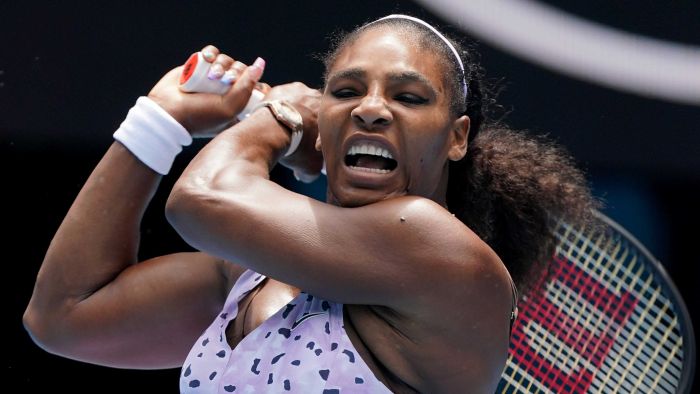Seven-time Australian Open singles champion Serena Williams has backed Tennis Australia’s quarantine rules ahead of the season-opening major amid criticism of the arrangements from other players.
Key points:
- Williams says tournament organisers are “doing it right” with their quarantine protocols
- The former world number one is among players quarantining in Adelaide
- Rafael Nadal wants players to feel privileged they have the opportunity to play at the Australian Oepn
Williams has been quarantining in Adelaide, as have the likes of Rafael Nadal and Novak Djokovic, and has been spared the hard 14-day lockdown that has affected 72 players who arrived in Melbourne almost a fortnight ago.
Several players based in Melbourne have publicly voiced their frustration about being confined to their rooms after passengers on the charter flights that carried them to Australia tested positive for COVID-19.
Spanish tennis player Paula Badosa slammed Australian Open organisers earlier this week, describing her extended period of hotel quarantine following a positive coronavirus test as “the worst experience” of her career.
After the 14-day isolation, players will be allowed to train normally and then compete at lead-up events next week.
Williams, speaking from her Adelaide hotel room on the US TV program The Late Show With Stephen Colbert, did not take aim at her fellow players for criticising quarantine conditions.
But she said she supported Tennis Australia’s stance on player quarantine ahead of the Open, which begins at Melbourne Park on February 8.
“They’re doing it right,” said Williams, who travelled to Australia with her young daughter Olympia.
Williams, who will be chasing a record-equalling 24th major singles title at Melbourne Park, described the quarantine rules for players as “super, super strict”.
“It’s insane and super intense but it’s super good, because, after that you can have a new normal like what we were used to last year this time in the United States,” she said.
Nadal calls for understanding
Nadal echoed a similar sentiment to Williams, feeling the players are privileged to be able to compete at the Australian Open.
The Spaniard urged his fellow participants to have a wider perspective of the strict health measures in Australia.
But he said he felt “very sorry” for those in hard isolation.
“When we came here we knew that the measures were going to be strict because we knew that the country is doing great with the pandemic,” Nadal told CNN.
“It’s normal to complain in some way but, on the other hand, when you have a little bit wider perspective of what’s going on … you see how many are dying around the world.
“You see how many people are losing their father, their mum, without having the chance to say goodbye.
“It’s a real thing, that’s what’s happening in my country for example. Close people to me are suffering this situation.”

Nadal, the 2009 Australian Open men’s winner, said players “can’t complain”.
“You have to stay a little more positive,” he said.
Badosa, ranked 67 in the world, was the first player to test positive for coronavirus upon arrival in Australia ahead of the tournament and cannot leave her hotel room until January 31.
She arrived in Melbourne after playing in Abu Dhabi earlier this month and was on her seventh day in quarantine when her test came back positive.




Badosa said she had been suffering from anxiety and claustrophobia, and had been limited to doing sit-ups in her hotel room and using water bottles as weights to try to stay in shape.
“The conditions here are lamentable, I wasn’t expecting that,” Badosa told Spanish newspaper Marca on Monday.
The number one thing people recommend when you have the virus is to open the windows to let in air, but I don’t have windows in my hotel room and it’s barely 15 metres square.”
Badosa was one of a group of players who complained on Twitter about having to quarantine in the first place, saying rules “changed overnight”.
But she deleted the tweet after she tested positive, instead writing a post saying she “understands the sad situation we are living” in and that “health will always come first”.
Reuters/ABC







